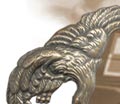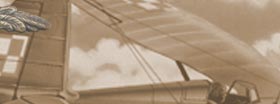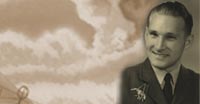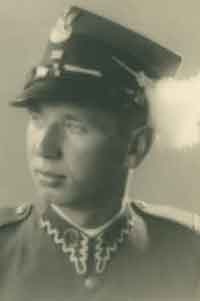
Mieczyslaw M. Wnuk
Polish Commandos
The following abridged story has been kindly lent by the family of Andrew J. Wnuk and the full version will be published in Polish.
Born in Zakopane on 1st January 1917 as one of six children belonging to Jan and Jozefa Krzeptowski Wnuk, Mieczyslaw (Mietek) lived in the family home at
No. 8 Koscieliska Street, which today is still run as a traditional gastronomic restaurant (U Wnuka) by the family. Like many young Poles, Mietek had completed
military training prior to the war breaking out. He entered the cadet officer school in the autumn of 1937 in Cieszyn, and was placed in the army reserves.
A number of events and subsequent meetings not only enabled him to survive the war, but also shaped his future life.
Mietek began skiing at the age of six, and in high school began competing in various regional ski jumping competitions. After high school, he competed in the 1937
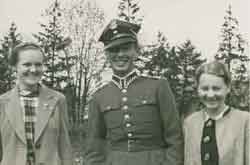 Polish national championships in Silesia where he placed 6th in his specialty, the Nordic combined event. In January 1938, Mietek was selected to join the Polish
National ski team, and entered his first international competition at the World Championships in Garmisch-Partenkirchen in
Germany. On his return from Germany, he met Stanley Switlik, a Polish emigrant from Trenton, New Jersey USA who was
later to reappear in Mietek’s life, sponsoring his immigration to the USA in 1950 and employing him at the Switlik Parachute Company for 33 years afterwards.
Polish national championships in Silesia where he placed 6th in his specialty, the Nordic combined event. In January 1938, Mietek was selected to join the Polish
National ski team, and entered his first international competition at the World Championships in Garmisch-Partenkirchen in
Germany. On his return from Germany, he met Stanley Switlik, a Polish emigrant from Trenton, New Jersey USA who was
later to reappear in Mietek’s life, sponsoring his immigration to the USA in 1950 and employing him at the Switlik Parachute Company for 33 years afterwards.
In February 1939, Zakopane hosted the F.I.S (Federation Internationale du Ski) World Championships with Mietek Wnuk competing as a member of the Polish
national team, and placing 8th overall in the Nordic Event. That same month, he also competed successfully in the world student championships in Lillehammer,
Norway where he placed first. With a growing reputation as an international competitor,
he had his sights on the 1940 Winter Olympics.
The September Campaign
In the early hours of 1st September 1939, Mietek has awoken by the sound of aircraft flying over the house. Assembled in the streets were neighbours seeking
information when a ‘highlander’ ran down the street shouting the Germans had invaded and the nearby village of Czarny Dunajec had been destroyed with houses
on fire and the villagers killed. Mietek, as an army reservist, had already been put on alert and had packed a rucksack with food and clothing.
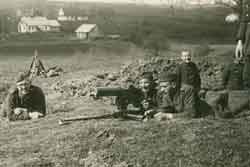 Colour coded cards indicated the priorities for call-up. Red was ‘immediate’ and blue indicated ‘wait until called’. As a holder of a blue card, Mietek decided to
meet up with some friends to the east of Zakopane at a mountain called Bachledski Wierch and from there, make their way independently to their unit in Nowy
Sacz via Nowy Targ to the north of Zakopane. His companions were Zdzislaw Kozol and Marion Charapinski. As they made their way north using the
countryside for cover, German tanks could already be heard in Nowy Targ, and while they crossed the river Dunajec to reach the Gorce Massif. After resting
up and eating, they climbed the Gorce Massif to their next rest-point at a lodge on the top at a place called Turbacz. As they approached the top, they met
others trying to flee the invaders. A German fighter plane spotted the group and returned to strafe, killing many of them. Mietek and his companions escaped
and set off more cautiously cross-country towards the northeast bartering for food from isolated woodland farmhouses.
Colour coded cards indicated the priorities for call-up. Red was ‘immediate’ and blue indicated ‘wait until called’. As a holder of a blue card, Mietek decided to
meet up with some friends to the east of Zakopane at a mountain called Bachledski Wierch and from there, make their way independently to their unit in Nowy
Sacz via Nowy Targ to the north of Zakopane. His companions were Zdzislaw Kozol and Marion Charapinski. As they made their way north using the
countryside for cover, German tanks could already be heard in Nowy Targ, and while they crossed the river Dunajec to reach the Gorce Massif. After resting
up and eating, they climbed the Gorce Massif to their next rest-point at a lodge on the top at a place called Turbacz. As they approached the top, they met
others trying to flee the invaders. A German fighter plane spotted the group and returned to strafe, killing many of them. Mietek and his companions escaped
and set off more cautiously cross-country towards the northeast bartering for food from isolated woodland farmhouses.
At Msylenice, Polish troops were setting up defensive positions and Mietek recognised an officer and old friend from Zakopane, Staszek Karpiel. Although
Mietek’s brother Henek was based in this army unit, he never met up with him until later in the September campaign. Nowy Sacz had already fallen, so the trio
were encouraged to travel towards Mielc after Staszek refused to accept them in the unit in order to improve their chances.
At Mielc, they met a man who had a horse and cart and offered them a lift. After six days of walking, the new transport was agreeable to the companions. The
owner left them the cart and they escaped from Mielc towards Tarnobrzeg in the east. It must be remembered that the bombing of transport systems and towns
had caused carnage and chaos on the routes they were taking. Nothing was safe or certain with food and water always difficult to find. At a cross roads, they
were temporarily halted by a slow moving column of dust encrusted troops and Mietek recognised his brother Tosiek in the column. His destination was
Tarnobrzeg to rejoin his wife. Having reached Tarnobrzeg, they found the town to be badly bomb damaged. A chance encounter with a motor bike ridden by
two old friends (Jasiek Schindler and Antoni Polenski) enabled Mietek to hitch a ride in the direction of Lwow, where the Wnuk family had originated and some
family still lived. The journey was arduous with slow moving columns of troops and civilians fleeing east with all that they could carry. Petrol was in short supply,
and one occasion Jasiek had to personally intervene at a standstill at a petrol station in order to keep the movement flowing.
Mietek arrived in Lwow on 10th September amongst the refugees, which had swollen the city to a million inhabitants and placed a great strain on the city’s
resources. In Janowska Street, he found the home of his father’s cousin who informed him that his own family had already been evacuated. Unable to gain
information on his unit or join up with other Polish forces, he was planning to travel further east to Brody as the Germans were only 30 miles from Lwow.
Hitching a ride, he made it to Brody to find the town still intact, but with many homes abandoned.
In Brody, a chance encounter with friends from Zakopane and a missed rendezvous saved him from a direct bomb hit. After making arrangements to meet some
friends at a restaurant, he arrived there but couldn’t locate them in the building, so he went to a different restaurant. While he was there an air raid forced Mietek
and others to
taking refuge under the tables. The blast from a near hit caused the floor to collapse depositing Mietek into the cellar. On emerging from the cellar, he witnessed
the carnage and devastation to Brody with businesses, homes and the hospital destroyed. The restaurant he had originally planned to dine in had received a
direct hit, leaving dismembered corpses and badly injured people lying in the street.
With the army in disarray, transport crippled and chaos all around, Mietek decided to make for the Romanian border with his friends. On 15th September, a
German plane dropped leaflets advising the war was over. As they rested in the open countryside on the night of the 17th September, they witnessed the first of
the Russian tanks invading from the east.
As they made their way towards Romania they came across the first Russian-occupied town, where they were taken prisoner by the Russians. Herded into a
churchyard that was surrounded by a high wall, Mietek learned the Polish Government had escaped to Romania. In the churchyard, he met a tailor from Zakopane
and a Lt. Lanowski of the Polish Air Force (PAF) who had been a well-known skier prior to the war. Also in the group was a woman secretary who had
travelled with Mietek from Lwow and had carried two large suitcases. One contained religious books and periodicals, which would likely have been regarded as
anti-communist propaganda by the Russians who were further likely to have the owners shot on the spot. As they were force-marched from the town, the
suitcase was discretely dumped in a farmyard. That first night was spent under armed guard in the open countryside in a field containing approximately two
thousand people, ranging from infants to the elderly.
The next day they were again forced to march towards the town of Podhajce. En-route, Mietek met Wojtek Kibicki from Zakopane who was riding a bike
alongside the column. At Podhajce, Mietek met an engineer, whom he had previously met in Lwow, walking with a cart. In a flash of inspiration, the engineer
shouted in perfect Russian that the civilians were to be set free. When challenged by a Russian soldier, he nonchalantly claimed it had come from an officer further
up the column. Mietek slipped away and mingled with the mass of refugees in the town centre where he met up with the engineer and they congratulated each
other on their escape.
Mietek spent ten days resting in a school used as a refugee centre run by Marion Glut, who had been the District Administrator in Nowy Targ. Glut had been
arrested by the Russians and was only released after the intervention of the widow of Jan Kasprowicz, the famous poet who, at one time, had reportedly secured
Lenin’s release from prison during the Austro-Hungarian occupation of southern Poland. Mietek decided to return to Lwow as Podhajce was becoming
increasingly more dangerous for Poles, not just from the invading German and Russian armies, but also from the Ukrainians, many of whom were anti-Polish,
and also disappointed that the Germans had not liberated them. Lwow had become engorged with refugees fleeing either the Germans or the Russian invaders.
There, he met his bother Henek and sister Janina. With Poland successfully partitioned between the Germans and Russians, and the Polish government now in
Rumania, Mietek learned that Polish forces were now being reorganized in France as a force in exile.
By the 21st October, life in Lwow was becoming increasingly more difficult for Mietek to be housed in his cousin’s house and so decided to make his way home to
Zakopane. In addition, the Russians had decided to tackle the refugee problem and demanded everyone to register with the authorities. To control the movement
of refugees between the German and Russian occupied zones, a refugee centre was established in Jaroslaw, at a bridge crossing the river San. The refugee centre
was in chaos with hundreds waiting to be interviewed and processed by the Russians at one end of the bridge, where questions ranged from previous occupation
to one’s activity during the brief war. Those who successfully passed the interrogation were allowed to cross to the German side where, surprisingly, no further
questions were asked.
Mietek, Henek, and Janina had destroyed all evidence of any contact with the military or governmental institutions. Mietek noticed Janina had successfully
passed the interview and a verbal order enabled her to pass through. Henek was less successful due to his age and responses, and was detained. Mietek
noticed an opportunity to slip through unnoticed and passed a message to Henek to follow. Henek pretended to be part of another family and this time passed
through without challenge. Once reunited, they obtained papers and travel permits from the Germans, and made their way to Krakow. Once in Krakow,
family friends assisted in finding a driver of a truck who had to travel south to Zakopane and home. On his return, he learnt from his mother that his brother
Wlodek had been captured by the Germans in Gdynia and was in a POW labour camp in northern Poland. His other brother Tosiek and his wife Steffa had also
survived and would be making their way from Tarnobrzeg soon.
Mietek's Escape
Zakopane had been transformed into a Sperrgebiet with German troops based in the town and a Gestapo unit in the
one of the sanatoriums. The atmosphere was one of oppression and fear with many young men missing and no one knowing of their fate. Most people kept
indoors or continued as best they could. While the German propaganda machine promised the Polish Highlanders a better life if they became part of
the Goralenvolk movement, under the leadership of Waclaw Krzeptowski (Mietek’s uncle), daily life was tough. (Note: Waclaw Krzeptowski was
ultimately tried in absentia and hung by the AK in January 1945 in his brother’s house – Julian Krzeptowski, a lawyer).
About 12th January 1940, just after his 23rd birthday, Mietek had a surprise visit from Staszek Karpiel and Czeslaw Dziadulski. He had not seen his best friends
since the 3rd September of the previous year. Disguised as refugees they had also made their way home to Zakopane. However, both had joined the
underground movement and had been briefed to find escape routes to Hungary. Both had just returned from their first trip and
Staszek carried money and documents destined for Warsaw. Henek volunteered to continue as a courier as the Gestapo were searching for Staszek. By
coincidence a family friend, Maciej Murrin, who owned a paper-mill in Bratislava in Czechoslovakia, was visiting Zakopane to find a new supplier of timber for the
mill. Mietek volunteered his services and obtained a permit, which he intended to use in his escape plans. He had already decided to escape on Staszek’s return
trip to Hungary. His mother had given him her jewelry, including her wedding and engagement rings, to help facilitate the escape.
In the early evening Mietek, Staszek, Czeslaw Dziadulski and his cousin, Jan Rajski made their escape after their rendezvous at the Wnuk family home. They set
off towards Koscielisko with Jan in the lead. As Jan was a former policeman, they would pretend to be searching for a burglar should they be stopped by the
Germans. It was bitterly cold as they set off for a lodge in the forest in an area of the Tatra Mountains called Hala Pyszna. The lodge was owned by a famous
pre-war skier, Stanislaw Marusarz and, on arrival, they noted a German patrol had already visited. Czeslaw returned to Zakopane and, after a break, the party
set off for a pass through the mountains and the toughest part of the climb.
Their next stop was a house near Vychodna in Czechoslovakia, whereupon Staszek took the lead. Crossing the border was an emotional moment for all the
men not knowing if they would return. Slovakia was also under German occupation. A Slovak Highlander who was working with the Polish Underground owned
the rest house at Vychodna, which was located close to a railway that would take them to the Hungarian border. Staszek gave the escapees a crash course in
Slovak – just enough to buy their rail tickets to Kysak near the Hungarian border. At Kysak, they alighted the train without incident and crossed the border
unobserved. At Koszyce, they went to the regional HQ of the Polish Underground run by a Mr. Skupien. Staszek went into town and sold the engagement
ring Mietek’s mother had given him on the night of his departure in order to obtain a train ticket to Budapest.
On arrival, both made their way to the Polish Refugee HQ and were interrogated by Polish Intelligence officers. Their debriefing covered potential escape
routes, as well as details on current conditions in Zakopane. Mietek’s background was vetted too. To his surprise, instead of an onward journey to France, he
was asked to return to Poland and set up safe places along the escape routes while escapees waited for their guides. Recognition and response codes were
memorised and Mietek realised the seriousness of the mission expected of him. They retraced their steps back to Zakopane, but without skis and in poor
winter weather conditions with their boots sinking in the deep snow. The journey was already dangerous and having lost their bearings in thick fog on the
Hungarian-Slovak border, they accidentally bumped into a Slovak border guard who took them to a hut. They convinced the guard they were returning home
now the war was over and had bought supplies with them as food supplies in Poland were bad. His search of the rucksacks missed the secreted money and
newspapers, and the offer of a ’snort’ of cognac from the guard was declined. By asking if they could catch a midnight train from Kysak to Vychodna, the
guard’s suspicions must have been thrown off, as he offered to take them to the station where he even bought the tickets for them. Once their skis were retrieved
from their hiding place in Vychodna, the group began the final leg to Zakopane. The weather had deteriorated with high winds blowing snow into deep drifts
making the journey extremely difficult and exhausting.
Zakopane was tense. Himmler, the Head of the SS and Gestapo was visiting the town and Mietek had to duck behind a wall to avoid Himmler’s escort
convoy of trucks and cars. On arrival at his home, his mother advised him of Henek’s arrest by the Gestapo and the house search. Mietek’s absence had
also been noted by the Germans. With danger now surrounding the whole family, Mietek had no option but escape that very night to avoid capture or further
reprisals against his family. It was the last time he would see his parents.
Without changing his clothes or farewells to his family, Mietek returned to Jan Rajski’s house to see if he would accompany him. Having been informed Jan was
out of town, he set off on his skis towards Koscielsko, using a new road under construction, to his Uncle Julian’s house, which was situated about three and a half
miles from Zakopane. Two German soldiers on patrol blocked his path at one point, but he quickly skied between them, leaving them too surprised to shoot.
Cutting across fields, Mietek was able to reach the house without further incident and alert his uncle who assisted in the escape plan. He left the house in
Koscielsko at 2.00am and using the moonlight made his way into the Koscieliska Valley and skied to the border. The danger of being intercepted by German
patrols forced Mietek to head for the safe house at Vychodna without delay as the cold or injury was equally as deadly as being cpatured. After resting for the
day in the safe house, Mietek caught the train for Kysak, this time taking his skis. Retracing his earlier route, he arrived in Koszyce and reported to the Polish
Underground H.Q.
A train ride to Budapest and the debriefing at Polish Military H.Q led to the preparation of fake passports and travel documents disguising him as a labourer
working in France. In a group of about a hundred, they left Budapest towards the end of February and the train journey took them through Yugoslavia to Trieste,
then Turin via Milan. Finding well-meaning treatment from the Italians, they made the crossing into France at Modane trouble-free. On arrival in Paris, Mietek
was again debriefed and his background and status verified using a former commander of the cadet school in Cieszyn, Major Antoni Michalik. All reports by
new arrivals were scrutinized, particularly Mietek’s. As a result he was sent with a friend, Karol Zajak, to Angers to meet officials of the Polish Government in
Exile. On his return to Paris, Mietek learnt he had been reassigned to the 1st Polish Division, 2nd Regiment under the command of Colonel Wladyslaw
Zietiewich and sent to the training camp at Coëtquidan.
After training, Mietek was assigned in April, 1940 to the 3rd Battalion of the Second Regiment of the French Army, and posted as an observer to a section of
the “Little Maginot Line,” which was weakly fortified near the town of Luneville, not far from Nancy. After surviving artillery bombardments and German attacks
across the little Maginot line, Mietek and some of his Polish soldiers found themselves surrounded, along with the remnants of the French Army, in St. Die.
Before the Germans could enter St. Die, Mietek and his friend, Mietek Rzegocinski, outfitted themselves in civilian clothes, acquired compasses, maps, and
money and set out for Lyon.
After the fall of France, Mietek spent three weeks travelling on foot to Lyon, with Mietek Rzegocinksi. They had many close calls with German troops, but
evaded capture. From July 1940 until November 1942, Mietek remained in Vichy or Free France. Like many young Poles awaiting official demobilization
after ‘The Fall’, time was spent making contact with friends or other links in an attempt to escape to England. Posted to the Camp de Carpiagne set on a
barren hillside to the southeast of Marseilles, he was in an ideal location for embarkation to N. Africa or escape to Spain. Camp life was strict with
emphasis upon staying informed on the current situation in Europe and sports to keep the men fit for eventual escape. Mietek met up with many Highlanders
from Poland and old friends who spent free time reminiscing of pre-war days, or listening to the radio for the latest reports on the Battle of Britain.
The camp’s activities also included small groups being sent out to reconnoitre escape routes through the Pyrenees into Spain. However, these plans were cut
short when it was learnt Polish escapees were being sent by Franco’s army to a concentration camp at Miranda de Ebro.
Mietek was demobilised on 31st August 1940 and advised to falsify his records in case he was captured, as the Germans were interested in Poles born in the
German occupied territory in Poland. At the end of September, he left for Grenoble to take up his studies and enrolled in the Faculty des Lettres to study
French as a ‘cover’. He lodged in the Hotel Terminus and soon met old friends from University days and Highlanders, which resulted in various Polish
cultural activities taking place. Mietek’s invitation to Grenoble had transpired through the initial introductions being made by Mme. Lucia Leszcynska-Desroches,
The ski competitions raised the profile of the Poles making a significant mark in the league results with Joseph Szczepaniak taking a first in slalom and Mietek
taking a second at an event held at Lans where out of fifty competitors, four Poles placed in the top ten. Skiing competitions proved to be a successful diversion
and cover. However, Mietek broke a leg while training and so became the team’s captain and trainer. In the French Students Championship at Morzine, three
Poles took firsts in: cross country, ski jumping, downhill, slalom, Nordic combined and the combined four events. Good press coverage raised the team’s profile
in sporting achievement and further success in competitions led to Mietek’s chance meeting with a German officer who offered him a lift back to Grenoble. The
offer was taken up on the orders of the Polish Intelligence, wherein Mietek challenged the officer into elucidation of the different treatment of the French and the
Poles by the Germans. To this the officer simply replied “Orders from Hitler.”
In March 1941, Mietek attempted to trace his brother Wlodzimierz (Wlodek)who had been captured in the September Campaign and sent to the concentration
camps at Sachsenhausen (Germany) and then Mauthausen (Austria). Letters to Wlodek had been returned stamped ‘Nicht in Stalag VB’ despite the
French Red Cross confirming he was in good health and able to write. However, as the Vichy French slid into greater collusion with Germany, Mietek stopped his
attempts to communicate, as this would reveal his location to the German authorities. In October 1941, Mietek left Grenoble on the encouragement of some
French for Antibes to start at the College National des Moniteurs d’Athletes. As a non-French national, it was a rare opportunity and made in recognition of
Mietek’s success with the ski team. The need to train future instructors was part of the re-appraisal of France’s defeat and Mietek made use of the opportunity to
enjoy as many sports as possible. In February Mietek was given permission to represent the town of Isere in a skiing competition for the 40km relay and took
second place in the event. In July 1942 he completed his studies and passed his final exams, which enabled him to enrol in Grenoble for a degree in commerce.
War and politics took a dramatic turn when the Japanese bombed the American navy at Pearl Harbour and the Vichy Government had become increasingly more a
puppet of the Nazis. Although encouraged to stay in Grenoble by his former commander, Major Brozowski, who was now in North Africa fighting alongside the
British Eighth Army, Mietek felt ill at ease with the changes and turmoil around him.
For much of 1942 until March 1943 Mietek split his time between studies, ski competitions and being hired to train the Dauphin team in cross country skiing and
ski jumping with great success. Indeed, it is this success that led to other opportunities in the near future. Germany had seized control of all France, as invasion
was a real threat. Poles were being arrested and everyone was thinking or talking of escape to Switzerland or Spain. Mietek remained in Grenoble,
concentrated in passing his part one final exams, and considered re-enrolling for the following autumn. The Polish authorities set up a special educational camp
just outside Grenoble at Laffrey, which was a cover for the training in escape. Sports and festivities opened up to local French athletes disguised the true purpose
and Mietek altered the camp’s physical training regime to toughen the students for their arduous journey. Small groups were being assembled for escape, and
on 1st September 1943, Mietek caught the train for Toulouse where a guide would meet him. Carrying an old suitcase and rucksack with as many necessities as
he could carry, he stepped onto the platform and dodged around the German sentries to be met by an old acquaintance Lieutenant Kostek Barzyzki. Five
Polish escapees assembled in the street outside the station and walked to a safe house nearby where they hid. The next day the small group caught a train to
Pamiers just south of Toulouse.
At Pamiers, the group followed their guide out of the town and into the foothills and were met by new local guides who would lead them to Andorra. En route,
they rested in a mountain hut and switched to their mountain clothes and discarded all un-necessary belongings. Some, who were ill prepared due to the short
period of notice and also not used to the rough mountain terrain, found the journey arduous. Travelling at night they skirted the town of Foix using the majestic
castle as a reference point. An almost indiscernible path led them to the border though woods and steep sided ravines. Once clear of a viaduct patrolled by
German sentries, the party were able to move into the high mountains where the cold and exhausted men nursed blistered feet. As dawn emerged, exposure
caused serious problems for a member of the group. Mietek took action by stripping off this man’s outer layers of clothing and rubbing his back with a towel to
avoid symptoms of exposure. This action by Mietek probably saved the man’s life. With shoes wearing out and fatigue setting in, they crossed the border into
Andorra. A rest at an isolated shepherd’s hut and a wonderful breakfast of bacon and eggs restored the spirits of the men.
Freedom was not to come until much later. Their route south took them through small towns like Los Escaldes towards the Spanish border and on towards
Barcelona. Fascist Spain was not safe and so the men remained cautious as they headed towards Gibraltar via Zarogossa. Arrested and imprisoned in terrible
conditions in Zarogossa, the thought of freedom and England appeared almost impossible, particularly as some detainees had been sent to the concentration
camp at Miranda. Despondency changed when Prince Pontiatowski was imprisoned with them. The Prince, who was a descendent of the Polish Royal Family
and a French artillery officer, was able to pass word to the British Consulate to make arrangements for Mietek’s release. About four weeks after his release from
prison, Mietek fled to Portugal, where he was picked up at night by a British boat manned by British sailors.
Gibraltar was reached by boat on the 12th December 1943. Mietek stayed in Gibraltar for seven weeks and arrived in England on the 4th February 1943 when
his ship docked at Bristol.
Mietek was debriefed and based upon his reputation as an excellent skier
and experience in mountain craft together with his qualifications as an outdoor sports
trainer, was posted to Dunblane in Scotland to train commandos.
Top of Page
